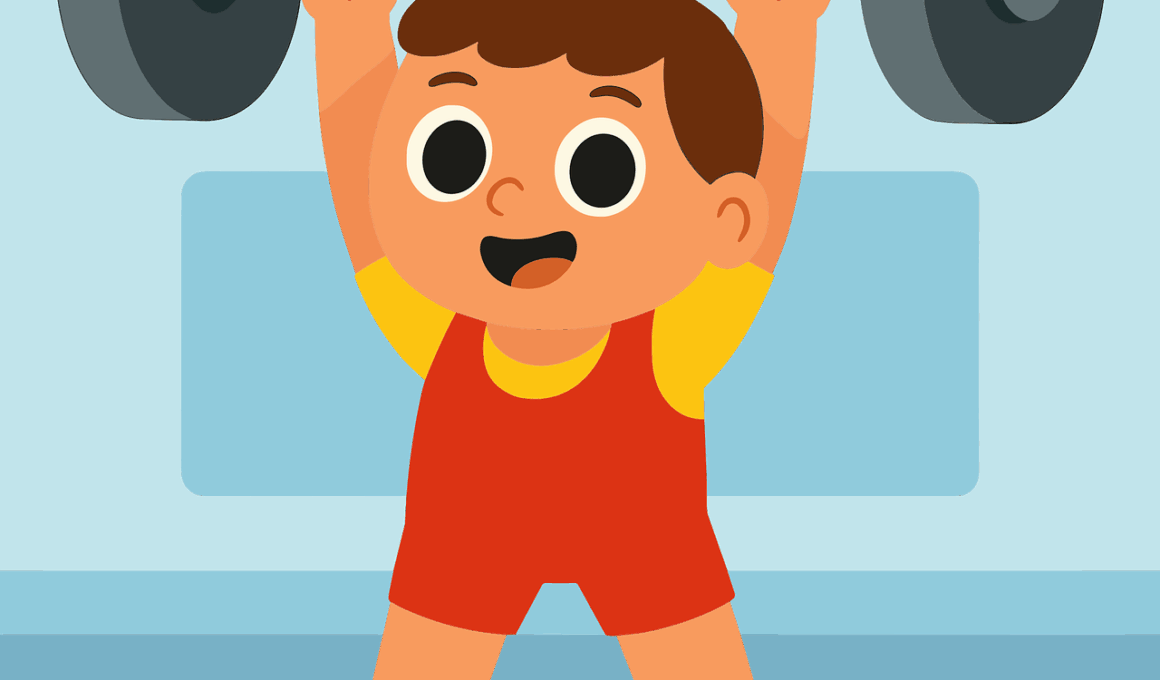Functional Training Success Stories: Kids Who Transformed Their Fitness
Functional training has become an essential component of children’s fitness regimens, promoting strength, agility, and coordination. Many parents have found that integrating functional training into their kids’ routines can lead to remarkable transformations. These programs focus on improving fundamental movements like squatting, jumping, and running, which are critical for any physical activity. Not only do children build physical capabilities, but they also develop self-confidence and increased body awareness. This holistic approach to fitness enables kids to engage with their bodies and understand how to move effectively, contributing positively to their overall health. For instance, one school implemented a functional training program, resulting in increased participation in physical activities and improved performance in sports. Teachers observed not only physical changes but also boosted academic performance, as physical activity is known to enhance cognitive skills. Additionally, kids tend to enjoy the playful, dynamic nature of functional training exercises, which can include obstacle courses and partner activities. Consequently, they associate fitness with fun, reducing resistance to being active. Parents often report enhanced social skills among children through teamwork and cooperation fostered during training sessions.
Another inspiring story comes from a young girl named Mia, who initially struggled with coordination and confidence. Enrolled in a local functional training program, Mia gradually overcame her hesitations and fears. The program’s structured yet playful environment allowed her to explore movement in a safe manner. With targeted exercises that emphasized core stability and balance, Mia learned to engage her muscles effectively. Her trainers incorporated fun activities as part of the regimen, enabling her to track her progress in a way that was uplifting. Over time, Mia not only improved her physical fitness but also gained newfound confidence. Her parents noticed how she began to take initiative in sports and join teams, realizing that her earlier hesitances were fading away. Furthermore, Mia’s story resonates with many other children who experience similar struggles. By encouraging a focus on functional training, kids like Mia benefit from personalized feedback and supportive peer interactions. These elements play a vital role in motivating children to push beyond their limits. Their remarkable transformations serve as a testament to the effectiveness of functional training for kids.
In another case, a group of friends decided to engage in functional training together during their summer break. They formed a small group led by a trainer who customized workouts for their individual abilities and goals. Each session was crafted to incorporate challenges that aligned with their interests, such as agility drills for soccer enthusiasts and strength training for aspiring gymnasts. The camaraderie gained through these sessions made the workouts something they eagerly anticipated each day. The focus on teamwork cultivated an environment where they encouraged one another, thereby fostering inclusive friendships. This motivated them to push beyond their perceived limits as they witnessed each other’s transformations. Notably, as the summer progressed, many of these kids noticed significant improvements in their physical fitness, stamina, and overall self-esteem. This led to heightened enthusiasm for pursuing sports during the school year, marking a shift from passive participation to active engagement. Group training sessions proved to some that fitness could also be a social experience. This story exemplifies how functional training not only shapes physical fitness but also enriches social bonds among children.
Benefits of Functional Training for Kids
Functional training offers numerous benefits that extend beyond just physical health. One primary advantage is the development of essential life skills, like discipline and teamwork. While engaging in group sessions, kids learn how to communicate effectively with peers. They develop listening skills when following guidance during workouts, building trust and respect for their trainers and teammates. Moreover, functional training’s focus on body mechanics helps prevent injuries by teaching children proper movement patterns from an early age. This education is crucial as it fosters an understanding of their capabilities and limits, ultimately aiding in injury prevention in sports. The adaptability of functional training allows for modifications based on age, physical condition, and specific goals. This caters to each child’s unique needs and ensures inclusivity. The variety inherent in functional training keeps children engaged and entertained while providing comprehensive conditioning. They experience improved balance, flexibility, and coordination, laying a powerful foundation for future athletic endeavors. Plus, as kids begin to see and feel the transformations in their fitness, their self-esteem soars, cultivating a lifelong passion for health and fitness.
Another notable success story belongs to a boy named Daniel, who was initially quite sedentary and indifferent towards physical activity. His parents enrolled him in a community functional training program designed for children. At first, Daniel was hesitant, feeling out of place among more active peers. However, the trainer’s engaging methods made learning enjoyable and accessible. Without pressure, Daniel began to slowly transform his attitude toward fitness, participating in activities that targeted his weaknesses. After a few months, the change was evident; he regained his energy and enthusiasm for outdoor play. The supportive environment emphasized communal support, inspiring him to challenge himself. Daniel started making healthier lifestyle choices, affecting his diet and encouraging his peers to be more active as well. His parents were thrilled with the holistic shift, which not only improved his physical fitness but also enhanced his mood and overall perspective on life. Daniel’s journey highlights how functional training can ignite a passion for activity that extends far beyond the gym. Instead of viewing exercise as a chore, he developed a lasting appreciation and understanding of fitness for overall well-being.
As these success stories unfold, it’s clear that functional training for kids isn’t just about builds muscle or skills. It’s about equipping children with tools to succeed beyond physical fitness. Lessons learned in these programs extend into other areas of life, teaching resilience, perseverance, and the value of teamwork. Training helps instill discipline, as kids adapt their work ethic to achieve personal goals. Through challenges they face in training, children learn not to shy away from adversity but to work through it collaboratively. The sportsmanship developed also teaches respect among peers, creating respectful interactions both on and off the field. Each child’s transformation story underscores how functional training lays the groundwork for future success. As they gain athletic proficiency, they develop a sense of identity that transcends their physical abilities, nurturing a healthier mindset overall. Those equipped with these insights carry them into their adult lives, carrying forward a legacy of health and wellness. It reinforces the importance of movement and activity in everyday life, making fitness not just a goal but an integral part of their lifestyles.
The Future of Functional Training for Kids
Looking ahead, the exciting prospects of functional training for kids are vast. As society becomes more aware of childhood obesity and the importance of active lifestyles, functional training programs are predicted to increase significantly in schools and communities. Innovative curriculums designed around functional training are becoming more popular, as parents and educators recognize the necessity of instilling physical literacy in children. This shift is drawing attention from experts in child development who advocate for varied movement patterns and active play as fundamental elements of health. Furthermore, the introduction of technology, with apps and interactive games linked to fitness, will engage kids effectively. Tools like wearable tech can track progress, motivating kids and encouraging friendly competitions. Functional training’s adaptability allows it to evolve alongside advancements in exercise science. This ensures that young people engage in age-appropriate movements based on their developmental stage. Ultimately, the focus on lifelong fitness will promote healthier lifestyles, combat sedentary behaviors, and foster a growing generation that values movement. The collective effort of parents, trainers, and schools can cultivate a culture of health, ensuring that success stories continue to inspire others.
Conclusion: Transforming Lives through Functional Training
In conclusion, functional training for kids offers a transformative experience for both their physical health and their overall well-being. The success stories we’ve explored demonstrate that when properly applied, functional training can enhance a child’s fitness levels, self-confidence, and social skills. Programs designed with children’s specific needs in mind ensure that they engage with movement in enjoyable ways, creating positive associations with being active from a young age. These experiences teach children valuable lessons about hard work, persistence, and community. By emphasizing progress and working collaboratively, kids not only improve their health but also form lasting friendships. As the trend toward functional training continues to grow, it emphasizes inclusivity and adaptability, navigating the unique challenges children face. The encouraging narratives of success reflect the immense potential of functional training to foster healthier lifestyles in younger generations. Investing in functional training for kids today is an investment in a fitter, healthier tomorrow. Ultimately, nurturing this bond with activity helps to lay down pathways that will guide children throughout their lives, ensuring that they thrive both physically and mentally.


